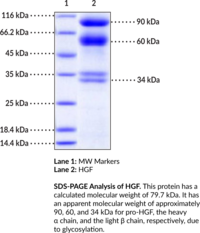Territorial Availability: Available through Bertin Technologies only in France
- Correlated keywords
- SF Chinese hamster ovaries ovary Arg-494 Val-495 HGFa Glu-32 DFNB39 DFNB-39 F-TCF TCFB FTCF FTCFB HGFB
- Product Overview:
Hepatocyte growth factor (HGF) is produced by cells of mesenchymal origin and has roles in cell proliferation, survival, motility, and morphogenesis.{53757,53758} HGF encodes the inactive polypeptide chain pre-pro-HGF that is composed of a signal sequence (1-31), a 69 kDa heavy ? chain (32-494), and a 34 kDa light ? chain (495-728).{53758} Degradation of the signaling peptide produces pro-HGF which is also cleaved between Arg494 and Val495, primarily by the protease HGF activator (HGF-A), to release the ? and ? chains. The free ? and ? chains then form an active heterodimer via disulfide bonding of cysteine residues that binds to the MET receptor to induce intracellular signaling. Transgenic overexpression of HGF increases ?-cell proliferation, insulin production, and glucose tolerance in mice.{53760} Pharmacological inhibition of HGF decreases ?-cell mass and induces hyperglycemia and glucose intolerance, markers of gestational diabetes, in pregnant rats. High serum levels of HGF are associated with metastasis, while low serum levels of HGF are positively correlated with progression-free survival and overall survival in lung, gastric, and colon cancers, as well as malignant melanoma.{53759} Intramuscular injection of HGF into ischemic myocardium increases blood flow and prevents myocardial dysfunction in a canine model of myocardial infarction.{53761} Cayman’s HGF (human, recombinant) protein can be used in cell-based assay applications. This protein, pro-HGF, which can be further processed into the ? and ? chains, consists of 697 amino acids, has a calculated molecular weight of 79.7 kDa, and a predicted N-terminus of Glu32 after signal peptide cleavage. By SDS-PAGE, under reducing conditions, the apparent molecular mass of the protein is 90, 60, and 34 kDa for pro-HGF, the heavy ? chain, and the light ? chain, respectively, due to glycosylation.
Cayman Chemical’s mission is to help make research possible by supplying scientists worldwide with the basic research tools necessary for advancing human and animal health. Our utmost commitment to healthcare researchers is to offer the highest quality products with an affordable pricing policy.
Our scientists are experts in the synthesis, purification, and characterization of biochemicals ranging from small drug-like heterocycles to complex biolipids, fatty acids, and many others. We are also highly skilled in all aspects of assay and antibody development, protein expression, crystallization, and structure determination.
Over the past thirty years, Cayman developed a deep knowledge base in lipid biochemistry, including research involving the arachidonic acid cascade, inositol phosphates, and cannabinoids. This knowledge enabled the production of reagents of exceptional quality for cancer, oxidative injury, epigenetics, neuroscience, inflammation, metabolism, and many additional lines of research.
Our organic and analytical chemists specialize in the rapid development of manufacturing processes and analytical methods to carry out clinical and commercial GMP-API production. Pre-clinical drug discovery efforts are currently underway in the areas of bone restoration and repair, muscular dystrophy, oncology, and inflammation. A separate group of Ph.D.-level scientists are dedicated to offering Hit-to-Lead Discovery and Profiling Services for epigenetic targets. Our knowledgeable chemists can be contracted to perform complete sample analysis for analytes measured by the majority of our assays. We also offer a wide range of analytical services using LC-MS/MS, HPLC, GC, and many other techniques.
Accreditations
ISO/IEC 17025:2005
ISO Guide 34:2009
Cayman is a leader in the field of emerging drugs of abuse, providing high-purity Schedule I-V Controlled Substances to federally-licensed laboratories and qualified academic research institutions for forensic analyses. We are certified by ACLASS Accreditation Services with dual accreditation to ISO/IEC 17025:2005 and ISO Guide 34:2009.





